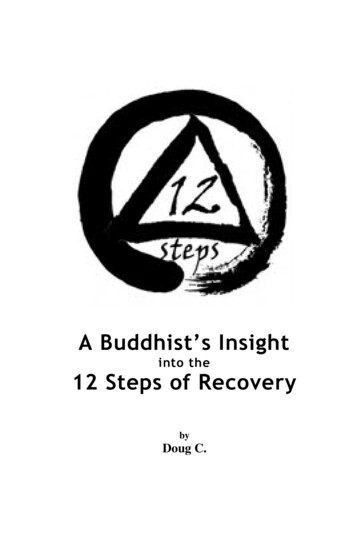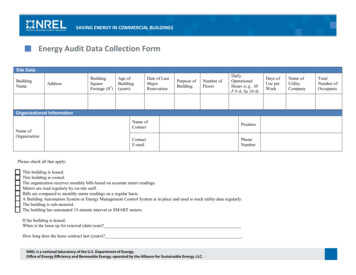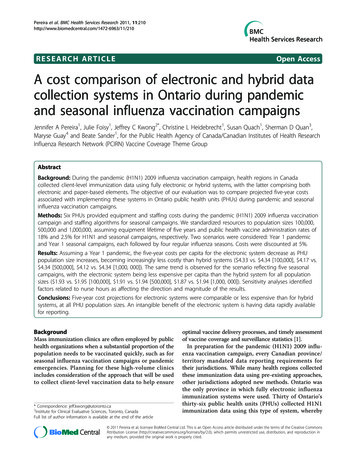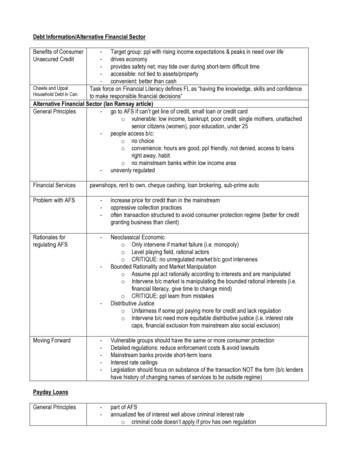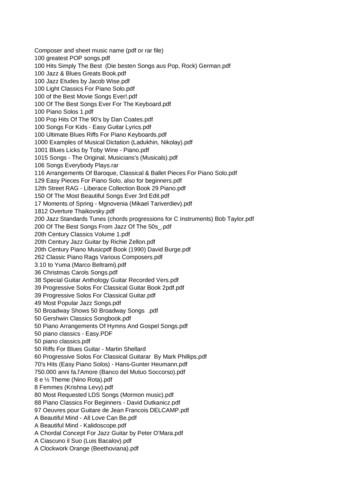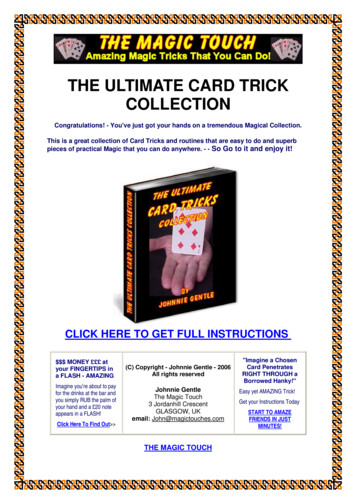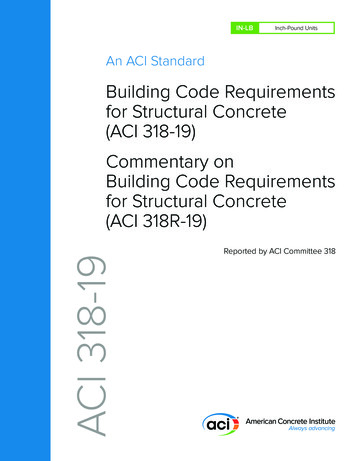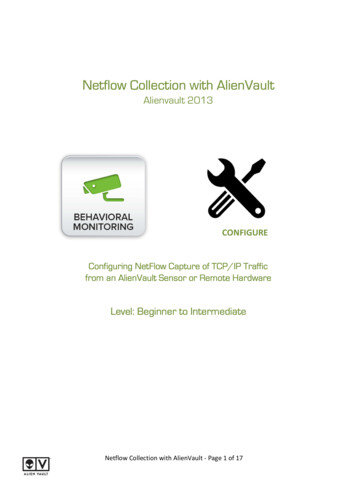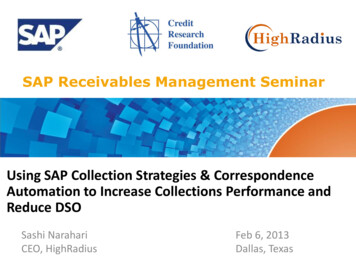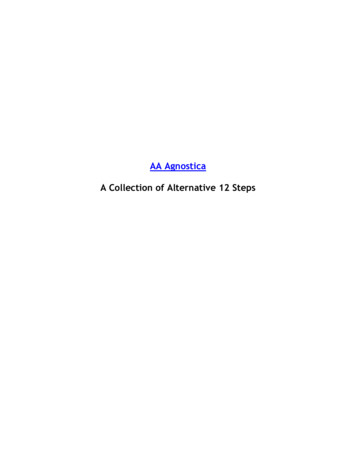
Transcription
AA AgnosticaA Collection of Alternative 12 Steps
IntroductionThere are many versions of the 12 Steps. In fact, there are about as many versions as thereare alcoholics in AA who use the program to get sober and to maintain their sobriety.The founder of AA, Bill W, discovered early on that individuals and groups adapted the 12Steps as found in Alcoholics Anonymous and he encouraged and supported them. In 1957, Billrecounts that when AA was started in countries where Buddhism was the dominant religion,the new AA groups being formed there felt that in order to join AA they needed to replacethe word “God” with “good” so that the practice of the Steps would be compatible with theirnon-theistic beliefs. After hearing about the changes to the Steps by these Buddhist AAgroups, Bill wrote:To some of us, the idea of substituting ‘good’ for ‘God’ in the Twelve Steps will seemlike a watering down of AA’s message. But here we must remember that AA’s Stepsare suggestions only. A belief in them as they stand is not at all a requirement formembership among us. This liberty has made AA available to thousands who neverwould have tried at all, had we insisted on the Twelve Steps just as written.(Alcoholics Anonymous Comes of Age)In keeping with Bill’s encouragement, agnostic groups in AA often create their ownalternative 12 Steps, replacing religious words like “God,” “Him” and ”Power” (all capitalizedin the Steps) with secular alternatives. These versions are not meant to replace the original12 Steps, but are solely for the use of the group, based upon the conscience of its members.We are happy to present a fair sampling of versions of the Steps in this document, used andwritten by both individuals and groups. It's just one way to help the suffering alcoholicunderstand that the Steps - adapted as need be - can be an important tool in the process ofrecovery from the terrible affliction of alcoholism.You will no doubt like some more than others. Which, of course, only confirms our point:Interpretation is an inescapable part of working the Steps.Page 2
Gabe’s 12 Steps(This Collection of Alternative 12 Steps was inspired by Gabe S, who had assembled a similarcollection, and so it’s only fitting that it begins with his version. Gabe’s story is on the AAAgnostica website: A Higher Power of my Understanding.)1.We admitted we could not control our drinking, nor do without it, that our lives hadbecome unmanageable.2.We came to believe that others who had had or understood our problem could help usreturn to and maintain sanity.3.We decided to accept what they said and act on their suggestions.4.We made a searching inventory of our bad feelings, of those aspects of our owncharacter that had contributed to these and of the harms we had done. We notedoccasions where we had done well and were glad of these.5.We showed the inventory to at least one other person and discussed it with them.6.We accepted our moral and personal weaknesses, and accepted that they needed tochange.7.We became willing to admit those weaknesses to others, where appropriate, and toheed any advice that they might offer.8.We became willing to make amends to those we had harmed.9.We made direct amends to such people wherever possible, except when to do sowould injure them or others.10.We continued to take personal inventory, when we were wrong promptly admitted itand when we had done well, recognized this.11.We adopted a practice of meditation and one of reflection upon our place in the worldand how we could contribute to it.12.Having experienced a psychic change as the result of these steps, we tried to carrythis message to other alcoholics, and to practice these principles in all our affairs.Page 3
Beyond Belief Agnostics(The group held its first meeting on September 24, 2009 in Toronto, Ontario, Canada.)1.We admitted we were powerless over alcohol – that our lives had becomeunmanageable.2.Came to accept and to understand that we needed strengths beyond our awarenessand resources to restore us to sanity.3.Made a decision to turn our will and our lives over to the care of the A.A. program.4.Made a searching and fearless moral inventory of ourselves.5.Admitted to ourselves without reservation, and to another human being, the exactnature of our wrongs.6.Were ready to accept help in letting go of all our defects of character.7.Humbly sought to have our shortcomings removed.8.Made a list of all persons we had harmed and became willing to make amends to themall.9.Made direct amends to such people wherever possible, except when to do so wouldinjure them or others.10.Continued to take personal inventory, and when we were wrong promptly admitted it.11.Sought through mindful inquiry and meditation to improve our spiritual awareness,seeking only for knowledge of our rightful path in life and the power to carry that out.12.Having had a spiritual awakening as the result of these steps, we tried to carry thismessage to alcoholics, and to practice these principles in all our affairs.Page 4
AA Agnostics of the San Francisco Bay Area(This version can be found on the area agnostic AA website.)1.We admitted we were powerless over alcohol—that our lives had becomeunmanageable.2.Came to believe and to accept that we needed strengths beyond our awareness andresources to restore us to sanity.3.Made a decision to entrust our will and our lives to the care of the collective wisdomand resources of those who have searched before us.4.Made a searching and fearless moral inventory of ourselves.5.Admitted to ourselves without reservation, and to another human being the exactnature of our wrongs.6.Were ready to accept help in letting go of all our defects of character.7.With humility and openness sought to eliminate our shortcomings.8.Made a list of all persons we had harmed, and became willing to make amends to themall.9.Made direct amends to such people wherever possible, except when to do so wouldinjure them or others.10.Continued to take personal inventory and when we were wrong, promptly admitted it.11.Sought through meditation to improve our spiritual awareness and our understandingof the AA way of life and to discover the power to carry out that way of life.12.Having had a spiritual awakening as a result of these steps, we tried to carry thismessage to alcoholics, and to practice these principles in all our affairs.Page 5
We Agnostics(This version can be found on the We Agnostics website. These 12 Steps originated inCleveland and are described as “training wheels” for the recovering alcoholic seeking his orher own spirituality.)1.We admitted we were powerless over alcohol-that attempts to control our drinkingwere futile and that our lives had become unmanageable.2.Came to believe that even though we could not fix our problem by ourselves,circumstances and forces beyond our personal control could help restore us to sanityand balance.3.Made a decision to accept things that were outside our control, especially whatalready is and to do the best with it.4.Made a searching examination and a fearless inventory of ourselves.5.Admitted to ourselves with total openness and to another human being, the exactnature of our wrongs.6.Became willing to let go of our behaviors and personality traits that could beconstrued as defects and were creating problems.7.With humility we acknowledged that we had these shortcomings and with openness wesought to eliminate these shortcomings.8.Made a list of all persons we had harmed, and became willing to make amends to themall.9.Made direct amends to such people wherever possible, except when to do so wouldinjure them or others.10.Continued to take personal inventory and when we were wrong promptly admitted it.11.Sought through contemplation and meditation to improve self-awareness and adopteda spiritual approach to life as our primary purpose.12.Having had a profound change in consciousness as the result of these steps, we tried tocarry this message to alcoholics, and to practice these principles in all our affairs.Page 6
Humanist Twelve Steps(B. F. Skinner, 1972 Humanist of the Year Award Winner, and a researcher and writer atHarvard University, drafted these Steps.)1.We accept the fact that all our efforts to stop drinking have failed.2.We believe that we must turn elsewhere for help.3.We turn to our fellow men and women, particularly those who have struggled with thesame problem.4.We have made a list of the situations in which we are most likely to drink.5.We ask our friends to help us avoid those situations.6.We are ready to accept the help they give us.7.We honestly hope they will help.8.We have made a list of the persons we have harmed and to whom we hope to makeamends.9.We shall do all we can to make amends, in any way that will not cause further harm.10.We will continue to make such lists and revise them as needed.11.We appreciate what our friends have done and are doing to help us.12.We, in turn, are ready to help others who may come to us in the same way.Page 7
The 12 Steps of Realistic Recovery(Created by Mike H. and found here: Realistic Recovery.)1.I can no longer deny I have an addiction, and admit my addiction can make me feelpowerless, and that my choices and decisions while unaware or in denial of myaddiction were destructive.2.I came to believe that realistic and rational thinking could restore me from theinsanity of addictive thinking.3.I will let myself be helped by myself and others by using realistic and rational thinkingand will never again turn my will and life over to addictive thinking.4.I will make a realistic and rational evaluation or “inventory” of my thoughts, feelingsand behaviors, both positive and negative. This is not to induce guilt and shame, butto evaluate where my attitudes, actions and decisions were not realistic or rational.5.I will now admit to myself, the exact nature of my thoughts, feelings and behaviors,both positive and negative. I will share and review this evaluation with another willingperson if I choose, unless where to do so would put myself or others at risk.6.I am entirely ready to allow realistic and rational thinking to reveal my destructivepatterns of addictive thinking and behaviour.7.I will apply realistic and rational thinking and behaviour to replace my addictivethinking and behaviour.8.I will make a list of all person’s I have harmed, or been harmed by, in a way thatmight have enabled my addictive thinking.9.I will take the responsibility of making amends and give the opportunity of receivingamends, except when to do so would put myself or others at risk.10.I will continue to evaluate my life, and when my thoughts, feelings and behaviors arenot realistic or rational, I will promptly admit it.11.I will seek to improve my conscious awareness of reality, striving for the knowledge ofwhat is real and rational and for the ability and determination to stop my addictivethinking and behaviour.12.Having had progress towards a realistic and rational self-awareness away fromaddictive thinking as a result of what I have accomplished with these principles, I shallpractice these principles in all areas of my life, and will be willing to share theseprinciples with others who think they might gain from them.Page 8
SOS(This alternative was created by “anonymous” and appears on the SOS – Secular Organizationfor Sobriety or Save our Selves - website.)1.I have a life threatening problem. My past efforts to establish sobriety have beenunsuccessful. I believe that I have choices and that my life no longer need beunmanageable. I accept responsibility for myself and my recovery.2.I believe that a power within myself in tandem with supports and strengths beyond myown awareness and resources can restore me to a healthier, more balanced, andpositive state of mind, body and soul.3.I make a decision to entrust my will and life to the care of myself, the collectivewisdom of those who have struggled with the same problem, and those in support ofme.4.I make a searching and fearless inventory of myself, of my strengths and weaknesses. Ichoose not to permit problems to overwhelm me, rather to focus on personal growthand the unconditional acceptance of others and myself.5.I admit to myself, and if I choose, to another person or persons the exact nature of thenegative, injurious aspects of my thinking and behavior. I explore the goodness withinmyself: the positive, courageous, and compassionate.6.I focus on healing, abolishing self-blame and shame, and understanding the boundariesof my responsibilities. I remain open to the help and support of others as I address thechallenge of change.7.I embrace introspection and work towards alleviating my shortcomings. I strive forpersonal growth and fulfillment over perfection, and to become integrated withcollective humanness.8.I will consider those that I have harmed and those that have harmed me. I will becomewilling to explore my feelings regarding those harms.9.I will make direct amends, as I deem appropriate and not injurious, to those whom Ihave harmed or negatively impacted and to myself.10.I will continue sincere and meaningful self-evaluation, and strive for personalbetterment.11.I will seek to improve my awareness and understanding of myself, my addiction, and ofother individuals and organizations with the common goal of arresting alcoholaddiction.12.With newfound acceptance and insight I will try to keep awareness, and compassionfor others and myself, in the fore.Page 9
White Bison(White Bison developed The Medicine Wheel, a culturally appropriate 12 Step program forNative American people. It uses a single word version of the Steps in which “each of the 12Steps is presented from the perspective of the value that it 10.Perseverance11.Spiritual Awakening12.ServicePage 10
Single Word (Virtue or Principle) Steps(Single word versions of the 12 Steps are not unusual. They have been printed in local areaAA newsletters and are commonly reproduced on pocket cards. Several single word versionshave been organized by religion at Sacred Connections and we have reproduced three snessSufferingDisease2BeliefCause of SufferingBelief3SurrenderLetting GoSurrender4Moral InventoryEightfold PathRighteousness5ConfessionRight SpeechPurification6WillingnessRight IntentionSelf-Restraint7HumilityRight ViewHumility8ForgivenessLoving KindnessGratitude9AmendsRight ConcentrationAlmsgiving10Daily ExaminationFive PreceptsRepentance11Prayer MeditationMindfulnessPrayer12ServiceSangha (Community)CommunityPage 11
A Buddhist’s Non-Theist 12 Steps(These Steps were created by Bodhi, from Sydney, Australia. They can be found on theRealistic Recovery website.)1.We admitted our addictive craving over alcohol, and recognized its consequences inour lives.2.Came to believe that a power other than self could restore us to wholeness.3.Made a decision to go for refuge to this other power as we understood it.4.Made a searching and fearless moral inventory of ourselves.5.Admitted to ourselves and another human being the exact moral nature of our past.6.Became entirely ready to work at transforming ourselves.7.With the assistance of others and our own firm resolve, we transformed unskillfulaspects of ourselves and cultivated positive ones.8.Made a list of all persons we had harmed.9.Made direct amends to such people where possible, except when to do so would injurethem or others. In addition, made a conscientious effort to forgive all those whoharmed us.10.Continue to maintain awareness of our actions and motives, and when we actedunskillfully promptly admitted it.11.Engaged through the practice of meditation to improve our conscious contact with ourtrue selves, and seeking that beyond self. Also used prayer as a means to cultivatepositive attitudes and states of mind.12.Having gained spiritual insight as a result of these steps, we practice these principlesin all areas of our lives, and make this message available to others in need ofrecovery.Page 12
Buddhist 12 Steps(Doug C’s “A Buddhist’s Insight into the 12 Steps of Recovery” is on the Buddhist RecoveryNetwork. A PDF of his essay can also be found here.)1.We admitted that we were powerless over our craving and addiction and that our liveshave become unmanageable.2.We came to believe that a Power greater than our individual selves could restore us towholeness.3.We made a decision to take refuge in and entrust ourselves to the compassion andguidance of a Greater Power of our understanding.4.We made a searching and fearless moral inventory of our thoughts, words, and deeds.5.We admitted to ourselves, our Greater Power, and another human being the precisemoral nature of our thoughts, words, and deeds.6.We became entirely ready to have our Greater Power transform our unwholesomecharacteristics into wholesome ones.7.We humbly turned our unwholesome and unskilful qualities over to our Greater Powerto be transformed into positive ones.8.We made a list of all persons we had harmed, and became willing to make amends tothem all.9.We made direct amends to such people wherever possible, except when to do sowould injure them or others.10.We continued to remain mindful of our mental, verbal, and physical actions, and whenwe acted unskilfully, promptly admitted it.11.We engaged in meditation and prayer in order to improve our conscious contact withour Greater Power (of our understanding) and to gain the insight and strength torealize and attain our Greater Power’s compassionate aspiration for us.12.Having realized a spiritual awakening as a result of these steps, we carry this messageto others in need of recovery, and try to practice these principles in all our affairs.Page 13
Islamic Twelve Steps to Recovery(There are some 21 Millati Islami groups across the United States who use this adaptation ofthe Steps.)1.We admitted that we were neglectful of our higher selves and that our lives havebecome unmanageable.2.We came to believe that Allah could and would restore us to sanity.3.We made a decision to submit our will to the will of Allah.4.We made a searching and fearless moral inventory of ourselves5.We admitted to Allah and to ourselves the exact nature of our wrongs.6.Asking Allah for right guidance, we became willing and open for change, ready to haveAllah remove our defects of character.7.We humbly ask Allah to remove our shortcomings.8.We made a list of persons we have harmed and became willing to make amends tothem all.9.We made direct amends to such people wherever possible, except when to do sowould injure them or others.10.We continued to take personal inventory and when we were wrong promptly admittedit.11.We sought through Salaat (prayer service) and Iqraa (reading and studying) to improveour understanding of Taqwa (G-d consciousness; proper Love and respect for Allah)and Ihsan (though we cannot see Allah, he can see us).12.Having increased our level of Iman (faith) and Taqwa, as a result of applying thesesteps, we carried this message to humanity and began practicing these principles in allour affairs.Page 14
Native American(This version was prepared for Native Americans by the Umatilla Tribal Alcohol Program.)1.We admitted we were powerless over alcohol, that we had lost control of our lives.2.We came to believe that a power greater than ourselves could help us regain control.3.We made a decision to ask for help from a Higher Power and others who understand.4.We stopped and thought about our strengths and our weaknesses and thought aboutourselves.5.We admitted to the Great Spirit, to ourselves and to another person the things wethought were wrong about ourselves.6.We are ready, with the help of the Great Spirit, to change.7.We humbly ask a Higher Power and our friends to help us change.8.We made a list of people who were hurt by our drinking, and want to make
alternative 12 Steps, replacing religious words like “God,” “Him” and ”Power” (all capitalized in the Steps) with secular alternatives. These versions are not meant to replace the original 12 Steps, but are solely for the use of the group, based upon the conscience of its members.File Size: 232KBPage Count: 20Explore furtherA TWELVE STEP WORKBOOKwww.12stepworkbook.orgProactive 12 Steps: A mindful program for lasting changewww.proactive12steps.comThe Proactive Twelve Steps - Weeblyliferecovery.weebly.comRecommended to you b

